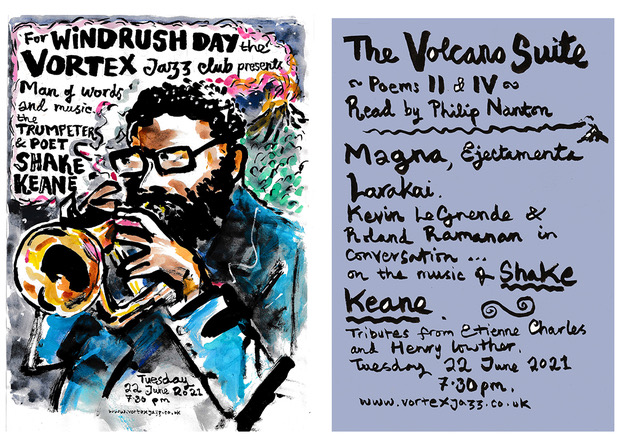Shake Keane image, courtesy of Val Wilmer
This year to mark National Windrush Day 2021, the Vortex Jazz Club presents Man of Words and Music – poet and trumpeter Shake Keane. Shake, né Ellsworth McGranahan was born on the island of St Vincent, West Indies, in 1927, his love of words and literature would earn him the soubriquet ‘Shake’ after the great William Shakespeare. The event is free to watch but we are asking people to donate to the St Vincent & Grenadines Volcano relief Fund https://gofund.me/90dbdc94
Our programme of 3 short films presents and examines part of the legacy of the music and words by Keane that will be broadcast across our social media platforms on 22nd June from 7.30pm.
The first film consists of Poem II and Poem IV from Keane’s Volcano Suite, narrated by Keane’s biographer Philip Nanton with a visual montage set to specially composed music by guitarist Gene Lawrence. Keane published the Volcano Suite (5 poems) after the 1979 eruption of La Soufrière, which he described as contemplations. In Poem II of the suite the volcano – a natural presence exists alongside humankind. Once in a while hot stuff rises to the surface erupting, spewing out ash over the land and inhabitants, expressed in the words: magna, ejectamenta and Larikai. Poem IV focuses on the displaced, soundbites of their observations and concerns conveying both a sense of disruption and continuity. In a word resilience.
This is followed by tributes to Shake Keane by Philip Nanton, Henry Lowther and Etienne Charles
The third film, Man of Words and Music, features the broadcaster Kevin Le Gendre with Roland Ramanan (son of Shake Keane) in conversation about four or so tracks they’ve chosen to give us insight into the pioneering creativity of this virtuoso trumpet and flugelhorn player. Please note that this 3rd short film will be available to catch-up for 3 days only.
Background
Shake was tutored in music and the trumpet by his father Charles whose approach to teaching music to his children was nothing less than militaristic, and at the tender age of six Shake gave his first performance on the trumpet. His talent for storytelling grew from the common gatherings when families would gather to recount stories such as the Anancy stories. While he was still at school Shake discovered his facility for rhyme and for storytelling. As a grammar schoolboy his goal was to come to England to study English literature. In 1952 Shake arrived in London like many others following on the heels of other Caribbean migrants who arrived on the Empire Windrush in 22 June 1948. Unlike many of the migrants who came to the Britain, he was a published poet, well read, read music, play the trumpet, and spoke French. These assets made it easier for Shake to gain employment as a freelance broadcaster for the BBC’s Caribbean Voices. He found himself in the company of other notable Caribbean writers – Sam Selvon, V.S. Naipaul, Edward Kamau Braithwaite, and George Lamming. In 1958 the bassist Coleridge Goode member of the pioneering Joe Harriot Quintet, recommended that Shake replace the departing Hank Shaw. The quintet would go on to produce the ground-breaking ‘Abstract’ and ‘Freeform’ music. While original and innovative, the quintet became one of the most controversial groups on the London jazz scene during the 1960s. Free jazz was certainly not cool jazz, but an adventurous exploration of new directions.
By 1965 Shake resigned from the BBC his music career was taking off and he was spending more time touring and in the recording studio. There were bouts of studying for his degree in English Literature, but he gave that up to focus on music: seeing the choice at that point between an honours degree in English, or musical career as a pioneer in a revolutionary sound.
Shake’s Jazz and collaborations with Jeremy Robson and Michael Garrick were popular with audiences. However, Shake’s role in poetry and jazz events was only through his music making: He was rarely asked to perform his own poems. By the beginning of 1970s Keane was looking for new horizons and he returned to St Vincent in 1973 to become Director of Culture for a time. His itinerant lifestyle meant he moved from one place to another, leaving a wife and two children behind, and a lover and another child, he moved to Germany and became a featured soloist with the Kurt Edelhagen Radio Orchestra and joined the famous ‘60s European-American jazz ensemble The Kenny Clarke-Francy Boland Big Band. In 1981 Keane moved to New York, and in 1989 to Norway where he died in 1997.
This video below contains the Volcano Suite, Notes by Philip Nanton, Tributes by trumpeters Henry Lowther and Etienne Charles.

